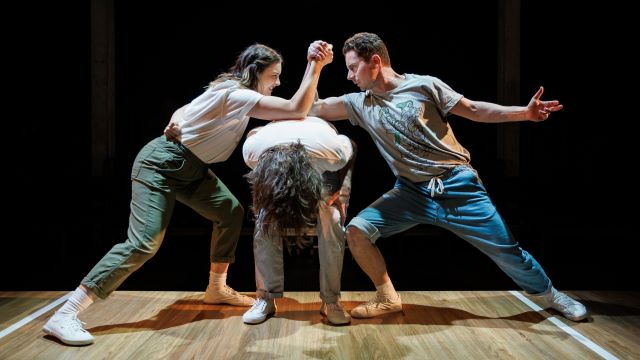Just a Boy, Standing in Front of a Girl
The title, of course, is a riff on the famous speech Julia Roberts makes to Hugh Grant in the movie Notting Hill. She is asking him to love her. He’s too scared. Just a Boy, however, is adapted from Euripides’ Medea (461 BCE). It puts this endlessly fascinating immortal horror story into a comedy cartoon sit-com contemporary setting.
That means some inevitable tweaks and changes. Playwright Jane Miller says in her program note that her intent, in employing a ‘tragicomic lens’, is ‘not to ridicule or trivialise the serious themes and events at the heart of this classical tragedy… the use of humour attempts to illuminate the darker aspects of the piece, bringing them into sharper focus.’ So, Miller sets herself a considerable challenge! Were the ‘darker aspects’ not in sharp focus before?
In this iteration ‘Medea’ (let’s use the original names), played with a fine ambivalence by Annie Lumsden, is no princess from Colchis, but rather a hapless young woman advised by a teacher (Sophie Lampel), don’t get an education, get a man – i.e. don’t get left on the shelf.
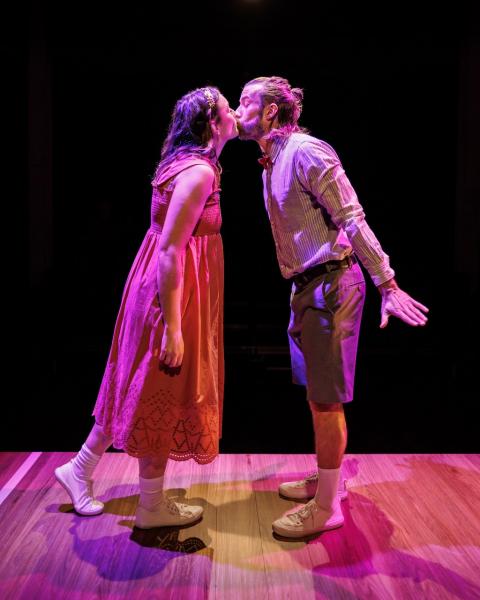
So Medea succumbs to the inept blandishments of Jason (Gabriel Partington), a hopeless magician and a hopeless singer, whose dream it is to ‘climb the corporate ladder’. Medea helps this inadequate buffoon and bolsters his self-confidence with lies so that he at least gets a foot on the ladder, but he is not the hero who could bring home the Golden Fleece - with or without Medea’s help. In fact, this Jason – with all due respect to Gabriel Partington’s clown performance – is so ridiculous that he diminishes our heroine.
On Emily Collett’s very simple set – a long platform successively stripped of its coverings as the play proceeds – the central couple are surrounded by many characters. There’s the band that won’t allow Jason, on tambourine, to join them, Creon, here a corporate boss, his siren airhead daughter Glauce, stony-faced cops, Medea’s varied neighbours, and more – all played with great variety, detail, verve and a sure feel for comedy by Sophie Lampel (perhaps over the top sometimes?), Hudson Emery and Glenn van Oosterom.
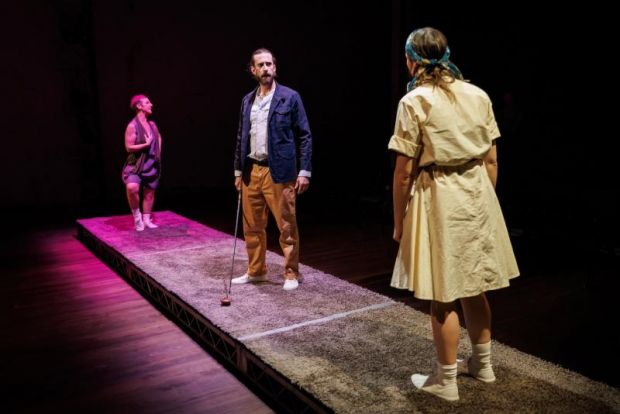
Director Beng Oh does push his luck: in pursuit of comedy he goes for – or allows his talented cast – excess, exaggeration and caricature. Whether this approach does illuminate ‘the darker aspects of the piece’ is perhaps debatable.
The themes – if not the entire plot - of Euripides’ much interpreted and reinterpreted original are here: the trusting, loving, help-meet woman in a hostile environment betrayed by a self-serving, ruthlessly ambitious man. But while Miller does not necessarily ‘ridicule or trivialise the serious themes’, she does render them somewhat, well, banal. While the central character is still betrayed, and her well-being and sanity are what’s at stake, she tails away into defeat, depression and pathos in a suburban house.
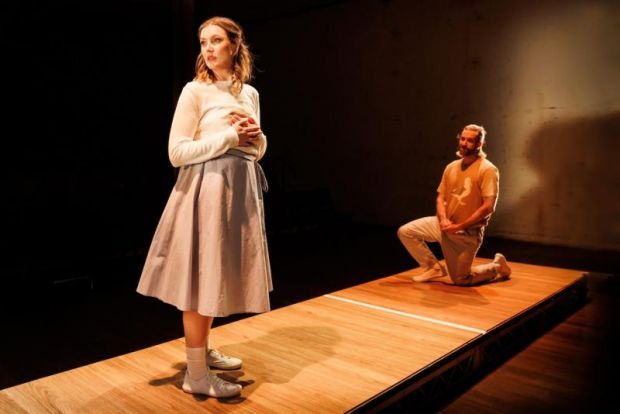
Here, when the Chorus, represented by Medea’s neighbours, comment on her, feel some sympathy for her but do not help her, the story almost marks time. Because we all know what she does – kill her children (and here only her children) – the play still needs to illuminate why and how – and it does, after a fashion. But she is – and we feel for her thanks to Lumsden’s performance - utterly abandoned and alone.
Miller has robbed her of all her skill at manipulating men – that is, all agency – except, in a sort of fugue-like state, to murder her children. Given this take on the story, Medea can’t escape to Athens on Helios’ golden chariot. But what Miller leaves us with – on the other hand – is something that is not in the least comic: an emotionally disturbed woman who may well end up in a mental hospital if not in jail – and an implication that it’s not wholly her fault.
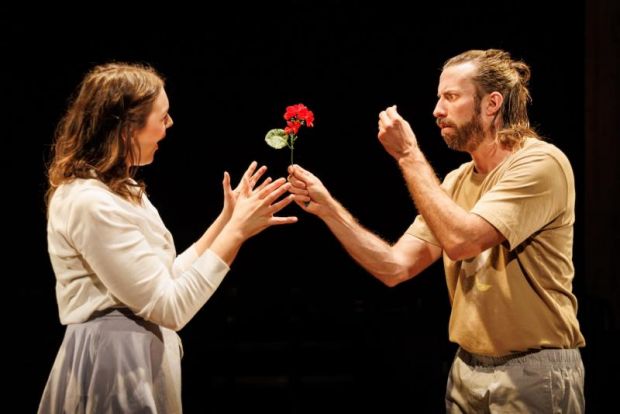
Jane Miller’s and Beng Oh’s interpretation in this retelling is valid as far as it goes – and its lively often very funny production is carried by a terrific cast – but it falls into that trap of transferring an enduring classic from the past into the present where the stakes and the moral equivalents are smaller. Yes, perhaps that’s ‘real’, but the ancients (and Shakespeare) wrote about kings, queens and murderous strife for good reasons. Just a Boy seems to get flatter and flatter as it goes along.
Michael Brindley
Photographer: Darren Gill
Subscribe to our E-Newsletter, buy our latest print edition or find a Performing Arts book at Book Nook.

